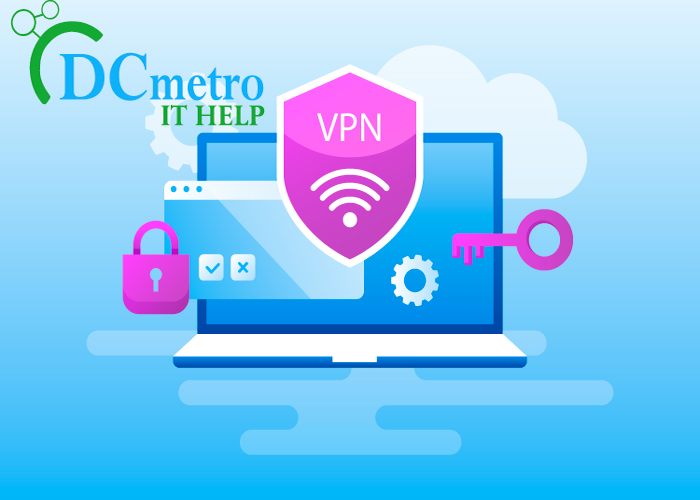In an increasingly interconnected world where online privacy and security are paramount concerns, Virtual Private Networks (VPNs) have emerged as essential tools. A VPN allows users to establish a secure and private connection over the internet, shielding their online activities from prying eyes. This article explores the significance of VPNs, their benefits, and how they empower individuals and organizations to navigate the digital landscape with confidence.
Contact us 202-810-7755 today to learn more about VPN. Please contact us to setup VPN for your business or if you have any questions or concerns.
DC Metro IT Help
What is a VPN? A VPN, or Virtual Private Network, is a technology that enables users to create a secure and encrypted connection between their device and the internet. By routing your internet traffic through an encrypted tunnel, a VPN shields your online activities from surveillance, hacking, and other threats. It provides anonymity by masking your IP address and encrypting your data, ensuring that your online presence remains private and secure.
Enhanced Security: One of the primary advantages of using a VPN is the bolstered security it offers. When connected to a VPN, your data is encrypted, making it nearly impossible for hackers or malicious entities to intercept and decipher. This is particularly crucial when using public Wi-Fi networks, such as those found in coffee shops, airports, or hotels, which are often susceptible to data breaches. By utilizing a VPN, you can protect sensitive information, such as passwords, credit card details, and personal documents, from falling into the wrong hands.
Privacy Protection: Preserving your online privacy has become increasingly challenging, as internet service providers (ISPs), advertisers, and even governments monitor and collect vast amounts of user data. VPNs play a vital role in preserving privacy by concealing your IP address and online activities from prying eyes. By encrypting your connection, a VPN ensures that your browsing history, search queries, and online behavior remain private and inaccessible to third parties.
Bypassing Geographical Restrictions: VPNs offer users the ability to bypass geographical restrictions imposed by certain websites and services. This is achieved by routing your connection through a server located in a different region or country. For instance, if a particular streaming service is unavailable in your country, you can connect to a VPN server in a region where it is accessible, granting you access to the content you desire. Additionally, VPNs can help you overcome censorship imposed by oppressive regimes, granting access to blocked websites and promoting freedom of expression.
Business and Remote Work: VPNs have become integral to the functioning of modern businesses and the remote workforce. They enable employees to securely access corporate networks, confidential files, and other resources while working remotely. VPNs provide a secure channel for data transfer and protect sensitive company information from potential breaches. With the increasing prevalence of remote work arrangements, VPNs have become an essential tool for maintaining productivity and safeguarding business operations.
In an era where our lives are intertwined with digital technologies, the need to protect our online privacy and security has never been more critical. VPNs offer a reliable solution by establishing secure connections, encrypting data, and preserving anonymity. With their ability to bypass restrictions, safeguard personal information, and facilitate secure remote work, VPNs empower individuals and organizations to navigate the digital landscape with confidence and peace of mind. As we continue to rely on the internet for various aspects of our lives, integrating a VPN into our online routine is a prudent step towards safeguarding our digital presence.



Leave a Reply